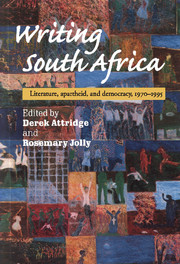Book contents
- Frontmatter
- Contents
- Contributors
- Acknowledgements and note on references
- South Africa, 1930–1996: a chronology
- Maps
- 1 Introduction
- 2 Interrogating silence: new possibilities faced by South African literature
- 3 I am dead: you cannot read: André Brink's On the Contrary
- 4 Endings and new beginning: South African fiction in transition
- 5 The post-apartheid sublime: rediscovering the extraordinary
- 6 Postmodernism and black writing in South Africa
- 7 Shame and identity: the case of the coloured in South Africa
- 8 A man's world: South African gay writing and the State of Emergency
- 9 The final safari: on nature, myth, and the literature of the Emergency
- 10 Interview
- 11 Speech and silence in the fictions of J.M.Coetzee
- 12 ‘Dialogue’ and ‘fulfilment’ in J.M. Coetzee's Age of Iron
- 13 Interview
- 14 Inside out: Jeremy Cronin's lyrical politics
- 15 Spinning out the present: narrative, gender, and the politics of South African theatre
- 16 South African theatre in the United States: the allure of the familiar and of the exotic
- Position papers
- Select bibliography: South African literary writing in English, 1970–1995
- Index
12 - ‘Dialogue’ and ‘fulfilment’ in J.M. Coetzee's Age of Iron
Published online by Cambridge University Press: 05 July 2011
- Frontmatter
- Contents
- Contributors
- Acknowledgements and note on references
- South Africa, 1930–1996: a chronology
- Maps
- 1 Introduction
- 2 Interrogating silence: new possibilities faced by South African literature
- 3 I am dead: you cannot read: André Brink's On the Contrary
- 4 Endings and new beginning: South African fiction in transition
- 5 The post-apartheid sublime: rediscovering the extraordinary
- 6 Postmodernism and black writing in South Africa
- 7 Shame and identity: the case of the coloured in South Africa
- 8 A man's world: South African gay writing and the State of Emergency
- 9 The final safari: on nature, myth, and the literature of the Emergency
- 10 Interview
- 11 Speech and silence in the fictions of J.M.Coetzee
- 12 ‘Dialogue’ and ‘fulfilment’ in J.M. Coetzee's Age of Iron
- 13 Interview
- 14 Inside out: Jeremy Cronin's lyrical politics
- 15 Spinning out the present: narrative, gender, and the politics of South African theatre
- 16 South African theatre in the United States: the allure of the familiar and of the exotic
- Position papers
- Select bibliography: South African literary writing in English, 1970–1995
- Index
Summary
Conceding that J. M. Coetzee's fiction ‘remains unmatched’ in South African writing for its ‘multivalence, formal inventiveness, and virtuoso self-interrogation of narrative production and authority’, Benita Parry argues that Coetzee's writing ‘dissipates the engagement with political conditions it also inscribes’ (above, p. 164). In its general terms, a similar argument had a fair hearing as the most widely held view of Coetzee amongst the left in South Africa until about the mid-eighties, a view which was prominently endorsed by Nadine Gordimer in her review of Life & Times of Michael K in the New York Review of Books. There would be little point in turning over all this soil again; however, Parry's challenging critique raises certain issues that might profitably be taken up as a way of enabling us to understand more fully the dynamics of Coetzee's writing of the Emergency period. I refer here to the late eighties when the shreds of what passed for civil society under apartheid seemed finally to give way under the immense strains of the political struggle. The novel produced under–and in response to – these conditions was, of course, Age of Iron.
The two, I believe central, terms in Parry's argument that I shall take up are ‘dialogue’ and ‘fulfilment’. With respect to dialogue, the ‘principles around which novelistic meaning is organized in Coetzee's fictions owe nothing to knowledges which are not of European provenance’ – the West therefore remains ‘the culture of reference’ (pp. 150–1).
- Type
- Chapter
- Information
- Writing South AfricaLiterature, Apartheid, and Democracy, 1970–1995, pp. 166 - 179Publisher: Cambridge University PressPrint publication year: 1998
- 7
- Cited by

